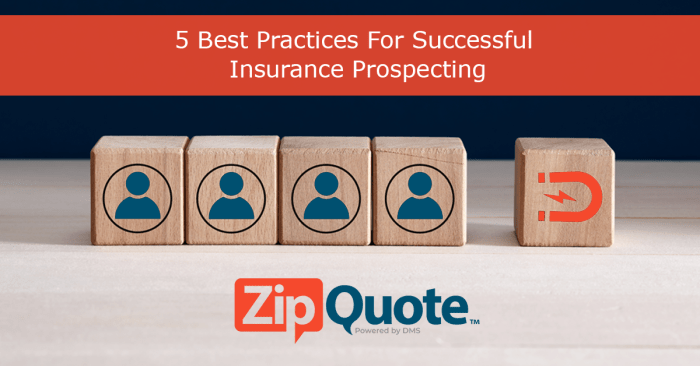In the realm of life insurance, prospecting serves as the cornerstone of success. It’s the art of identifying, engaging, and nurturing potential clients who may benefit from the security and protection that life insurance offers. In this comprehensive guide, we’ll delve into the intricacies of prospecting, providing life insurance agents with a treasure trove of tips and strategies to expand their client base and achieve remarkable results.
From market research and networking to referrals and online marketing, we’ll explore the diverse avenues available for prospecting. We’ll also uncover the secrets of effective sales presentations, lead generation, and follow-up, empowering agents with the knowledge and skills needed to excel in this dynamic field.
Market Research
In-depth market research is the cornerstone of successful life insurance sales. Understanding your target audience, their needs, and their pain points is essential for tailoring your approach and optimizing your sales pitch.
Market research empowers you to identify potential clients, segment them into distinct groups, and develop customized strategies that resonate with each segment.
Techniques for Identifying Potential Clients
- Demographic Analysis: Study the age, income, location, and other demographic characteristics of your target market to pinpoint potential clients who align with your ideal customer profile.
- Psychographic Analysis: Delve into the values, attitudes, and lifestyle preferences of your target audience to understand their motivations and aspirations. This knowledge helps you craft messaging that connects with their emotional needs.
- Customer Surveys: Conduct surveys to gather direct feedback from your target market. Ask questions about their insurance needs, concerns, and preferences. Surveys provide valuable insights into the minds of your potential clients.
- Focus Groups: Organize focus groups to facilitate in-depth discussions with a select group of potential clients. Focus groups allow you to explore their attitudes, beliefs, and behaviors in greater detail.
- Competitor Analysis: Analyze the strategies, products, and marketing tactics of your competitors. Identifying their strengths and weaknesses helps you differentiate your offerings and position yourself as a superior choice.
Networking

Networking is a vital aspect of prospecting for life insurance agents, enabling them to expand their reach, build relationships, and generate leads. By fostering connections with individuals and organizations, agents can establish themselves as trusted advisors and position themselves as valuable resources within their communities.
Building relationships with key individuals and organizations involves attending industry events, joining professional associations, actively participating in community activities, and leveraging social media platforms. These efforts help agents create a network of potential clients, referral sources, and industry professionals who can provide valuable insights and opportunities.
Networking Events
Networking events offer an excellent platform for agents to meet and connect with prospective clients, industry peers, and potential referral sources. These events can include seminars, conferences, trade shows, and social gatherings. By actively participating in these events, agents can introduce themselves, exchange contact information, and initiate conversations that can lead to future business opportunities.
Social Media
Social media platforms have become powerful tools for prospecting in the life insurance industry. By creating a strong online presence, agents can connect with potential clients, share valuable content, and establish themselves as thought leaders. Engaging with prospects through social media helps build relationships, foster trust, and generate leads.
Referrals
Referrals are a goldmine for life insurance agents. They’re the key to building a successful and sustainable business.
Why are referrals so powerful? Because they come from people who already know and trust you. When someone you know recommends you, it carries a lot of weight. It’s a sign that you’re someone who can be trusted to provide quality service and products.
Techniques for Generating Referrals
- Ask for referrals. Don’t be afraid to ask your existing clients and partners for referrals. Most people are happy to help out a friend or colleague, especially if they’ve had a positive experience with you.
- Provide excellent service. The best way to generate referrals is to provide excellent service to your clients. When you go above and beyond to meet their needs, they’re more likely to recommend you to their friends and family.
- Be active in your community. Get involved in your community and build relationships with other professionals. When people know you and trust you, they’re more likely to refer you to their clients.
Building a Strong Referral Network
- Be a giver. The best way to build a strong referral network is to be a giver. Help out other professionals whenever you can, even if it doesn’t directly benefit you. When you’re always willing to lend a hand, people will remember you and be more likely to refer you to their clients.
- Be a connector. Introduce your clients and partners to each other whenever possible. When you connect people, you’re creating opportunities for them to do business with each other. And when they do, they’re more likely to remember you and refer you to their friends and family.
- Stay in touch. Stay in touch with your clients and partners on a regular basis. Send them holiday cards, birthday cards, or just a quick email to check in. When you stay in touch, you’re keeping your name top-of-mind and making it more likely that they’ll refer you to their friends and family.
Cold Calling
Cold calling is a method of prospecting for life insurance leads by directly reaching out to potential clients via phone calls without prior contact or introduction. It requires effective communication skills, knowledge of life insurance products, and a systematic approach to generate leads and increase sales.Effective
cold calling involves following a structured process, including:
- Research: Gathering information about the target market, their needs, and preferences to tailor the pitch accordingly.
- Preparation: Creating a comprehensive list of prospects, preparing a compelling script, and practicing delivery to sound natural and confident.
- Engagement: Initiating the conversation with a friendly and professional tone, establishing rapport, and asking open-ended questions to understand the client’s needs.
- Presentation: Presenting the life insurance products or services that align with the client’s needs, highlighting their benefits and value.
- Handling Objections: Anticipating and effectively addressing common objections, providing clear and concise answers to build trust and credibility.
- Closing: Asking for the sale or scheduling an appointment for further discussion, ensuring a smooth transition to the next step in the sales process.
Persistence and follow-up are crucial in cold calling. Many prospects may not be immediately interested or available, so it’s important to follow up consistently, staying in touch and nurturing the relationship until they are ready to make a decision.
Online Marketing

Online marketing offers a powerful avenue for life insurance agents to expand their reach and attract potential clients. By leveraging various digital channels, agents can establish a strong online presence, engage with their target audience, and generate leads.
Creating a Professional Website
A professional website serves as the cornerstone of an agent’s online presence. It provides a platform to showcase their expertise, highlight their services, and build trust with potential clients. When creating a website, it’s crucial to focus on user experience, ensuring it’s easy to navigate, visually appealing, and optimized for mobile devices.
The content should be informative, engaging, and regularly updated with fresh and relevant information.
Utilizing Social Media Platforms
Social media platforms are powerful tools for connecting with potential clients, building relationships, and sharing valuable content. By creating a strong social media presence, agents can engage with their target audience, share industry insights, and establish themselves as thought leaders.
Consistency is key when it comes to social media marketing, as regular posting and interaction help build a loyal following.
Email Marketing for Nurturing Leads
Email marketing remains an effective channel for nurturing leads and staying in touch with potential clients. By building an email list and sending out regular newsletters, agents can provide valuable information, promote their services, and encourage readers to take action.
Personalization is essential in email marketing, as tailored messages resonate better with recipients and increase engagement rates.
Leveraging Search Engine Optimization ()
Search engine optimization () is crucial for increasing a website’s visibility in search engine results pages (SERPs). By optimizing website content, using relevant s, and building high-quality backlinks, agents can improve their website’s ranking and attract more organic traffic. is an ongoing process that requires continuous monitoring and adjustment to stay ahead of the competition.
Content Marketing

Content marketing is a strategic approach to creating and distributing valuable, relevant, and consistent content to attract and retain a clearly defined audience and drive profitable customer action.
In the context of life insurance prospecting, content marketing involves creating and sharing educational and informative content that addresses the concerns, questions, and pain points of potential clients. The goal is to establish thought leadership, build trust, and position the agent as a knowledgeable and reliable resource.
Creating Valuable Content
To create valuable content that resonates with potential clients, life insurance agents should focus on the following:
- Understand Your Audience: Identify the specific needs, interests, and challenges of your target audience. Tailor your content to address their unique concerns and provide solutions that are relevant to their lives.
- Solve Problems: Create content that provides practical solutions to common problems or challenges faced by potential clients. Offer actionable advice, tips, and strategies that can help them make informed decisions about their life insurance needs.
- Educate and Inform: Develop content that educates and informs potential clients about life insurance concepts, benefits, and options. Use simple language and clear explanations to make complex topics easy to understand.
- Be Authentic: Create content that reflects your unique expertise, experience, and personality. Share your insights and perspectives in a genuine and authentic manner to build a connection with your audience.
Promoting Content Effectively
Once you have created valuable content, it’s important to promote it effectively to reach your target audience. Here are some strategies to consider:
- Social Media: Share your content on relevant social media platforms where your target audience is active. Engage with your audience through comments, likes, and shares to build a community around your brand.
- Email Marketing: Create an email list of potential clients and use email marketing to promote your content and drive traffic to your website or blog.
- Search Engine Optimization (): Optimize your content for relevant s and phrases to improve its visibility in search engine results pages (SERPs). This will help potential clients find your content when searching for information related to life insurance.
- Paid Advertising: Use paid advertising platforms such as Google Ads or social media ads to promote your content and reach a wider audience. Target your ads to specific demographics, interests, and s to ensure that your content is seen by the right people.
Personalization

In today’s competitive life insurance market, personalizing prospecting efforts is not just a good idea but a necessity. Tailoring messages and approaches to individual clients can significantly enhance the customer experience and increase conversion rates.
Understanding the Client
The foundation of personalization lies in understanding the client’s unique needs, goals, and circumstances. This involves gathering information about their financial situation, risk tolerance, family dynamics, and future aspirations. By taking the time to learn about the client, agents can craft messages that resonate with their specific pain points and aspirations.
Lead Generation

Lead generation is the lifeblood of any successful life insurance agent. It’s the process of identifying and attracting potential customers who may be interested in purchasing life insurance policies. There are a variety of lead generation strategies that agents can use to fill their sales pipeline, including both traditional and digital methods.
In today’s digital age, online lead generation has become increasingly important. Agents can use social media, search engine optimization (), and pay-per-click (PPC) advertising to reach potential customers online. However, traditional lead generation methods, such as cold calling and networking, can still be effective.
Lead Generation Tools and Platforms
There are a number of lead generation tools and platforms available to help agents automate and streamline their lead generation efforts. These tools can help agents find and qualify leads, track their progress, and nurture leads through the sales process.
Some popular lead generation tools and platforms include:
- Customer relationship management (CRM) systems
- Marketing automation platforms
- Social media management tools
- Email marketing platforms
- Pay-per-click (PPC) advertising platforms
Qualifying Leads and Prioritizing Follow-Up Efforts
Not all leads are created equal. Some leads are more likely to convert into sales than others. It’s important for agents to qualify leads and prioritize their follow-up efforts accordingly. Some factors to consider when qualifying leads include:
- The lead’s need for life insurance
- The lead’s budget
- The lead’s timeline for making a purchase
- The lead’s level of interest in life insurance
By qualifying leads and prioritizing their follow-up efforts, agents can increase their chances of closing deals and generating more revenue.
Sales Presentations

Effective sales presentations are crucial for prospecting, as they allow life insurance agents to connect with potential clients, establish credibility, and persuade them to take the next step. A well-structured and engaging presentation can make all the difference in converting leads into paying customers.To
create engaging and informative presentations, life insurance agents should consider the following tips:
1. Know Your Audience
Understanding your target audience is essential for tailoring your presentation to their specific needs, interests, and concerns. Research their demographics, pain points, and financial goals to create a presentation that resonates with them.
2. Clear and Concise
Keep your presentation clear, concise, and easy to understand. Avoid using jargon or technical terms that your audience may not be familiar with. Use simple language and visuals to illustrate your points effectively.
3. Structure Your Presentation
Organize your presentation into a logical flow, with a clear introduction, body, and conclusion. Start with a strong hook to grab your audience’s attention, then provide valuable information and insights that address their needs. End with a compelling call to action that encourages them to take the next step.
4. Use Visual Aids
Visual aids, such as charts, graphs, and images, can help make your presentation more engaging and memorable. Use them strategically to illustrate key points, provide data, and capture your audience’s attention.
5. Storytelling
Storytelling is a powerful tool that can connect with your audience on an emotional level. Share stories of real people who have benefited from life insurance or faced financial challenges without it. This can help your audience relate to the importance of having life insurance and make them more receptive to your message.
Follow-Up

In the competitive world of life insurance sales, following up with potential clients is crucial to nurturing leads and increasing your chances of closing deals. It’s not just about making the initial contact; it’s about building relationships and demonstrating your commitment to providing personalized service.
Effective follow-up involves strategic timing and choosing the right methods of communication. Here are some tips to help you follow up effectively:
Timing
- Respond promptly: When you receive an inquiry from a potential client, respond within 24 hours to show your responsiveness and interest. This sets a positive tone for the relationship and shows that you value their time.
- Schedule follow-up calls: After the initial contact, schedule a follow-up call to discuss their needs and concerns in more detail. This allows you to gather more information and tailor your solutions accordingly.
- Send regular updates: Keep your clients informed about the status of their application or policy. Regular updates demonstrate your professionalism and help build trust.
Methods of Communication
- Phone calls: Phone calls are a great way to have direct conversations with potential clients. They allow you to build rapport, address their concerns, and answer their questions in real-time.
- Emails: Emails are a convenient way to stay in touch with clients, send updates, and provide additional information. Make sure your emails are personalized and relevant to the client’s needs.
- Social media: Social media platforms can be used to connect with potential clients, share valuable content, and build relationships. Use social media to engage with clients, answer their questions, and provide helpful advice.
Persistence and Building Relationships
Following up with potential clients requires persistence and a commitment to building relationships. It’s not always easy to get a response, but it’s important to stay persistent and continue to reach out. The more you stay in touch, the more likely you are to build trust and eventually close the deal.
Building relationships with potential clients is key to success in life insurance sales. By taking the time to get to know your clients, understand their needs, and provide personalized service, you can create long-lasting relationships that lead to repeat business and referrals.
Summary

Remember, prospecting is a continuous journey, requiring unwavering dedication, adaptability, and a genuine desire to serve clients. By embracing the strategies Artikeld in this guide, life insurance agents can transform themselves into prospecting powerhouses, securing their place as trusted advisors and protectors of families and individuals.
FAQ Corner
What is the significance of market research in prospecting?
Market research provides invaluable insights into the needs, preferences, and behaviors of potential clients. This knowledge enables agents to tailor their approach, messaging, and products to resonate with specific customer segments, increasing their chances of success.
How can agents leverage networking to generate leads?
Networking is a powerful tool for building relationships with key individuals and organizations within the community. By actively participating in industry events, joining professional associations, and engaging on social media, agents can expand their sphere of influence and uncover new prospecting opportunities.
What are some effective techniques for generating referrals?
Encouraging existing clients to refer their friends, family, and colleagues is a highly effective way to grow a client base. Agents can foster a referral-friendly environment by delivering exceptional service, maintaining regular communication, and expressing gratitude for referrals received.
How can agents make the most of online marketing channels for prospecting?
In today’s digital age, online marketing offers a wealth of opportunities for reaching potential clients. Creating a professional website, utilizing social media platforms, implementing email marketing campaigns, and optimizing for search engines can help agents attract and engage prospects online.
Why is personalization crucial in prospecting efforts?
Personalization is key to establishing meaningful connections with potential clients. By tailoring messages, approaches, and recommendations to individual needs and preferences, agents can demonstrate their genuine care for clients, building trust and increasing the likelihood of conversions.



